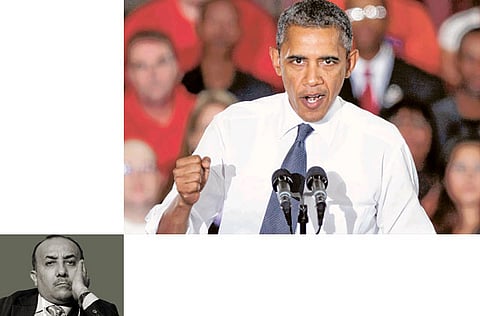Ignorance is bliss to most Americans
Not many people are concerned about the comatose Middle East peace process or the ascendance of Palestine as a full-fledged member of Unesco

I have been visiting the US since 1979. The first time I was there was on Christmas Eve. I went there as a student when things were simple and the US was innocent. I always say back then the US looked as Tom Hanks looked and acted in his famous drama-comedy movie Forrest Gump back in 1994. In the last few years I have cut down drastically on my travel to the US. First, I am now in my early fifties, getting busier, becoming more selective at attending conferences. Add to that the hassle of getting a US visa, thanks to Osama Bin Laden's misguided adventure. Then there's the long haul flight, involving two days travelling back and forth to attend a two-day conference. So, now my journeys to the land of the free and the home of the brave are few and far between.
Every time I visited the US after finishing my college education and obtaining my masters and PhD degrees in Political Science, I felt I was back home. Don't know why but I felt more at ease and less burdened when I was in the US than in Europe. Maybe it is because of my bias towards the US, maybe because of the informal nature of Americans and their openness compared to the stuffy, formal and closed European nature. Every time I am in the US, it is a journey down memory lane. I feel nostalgic and hark back to the 1980s and early 1990s, when things were less complicated. No doubt, today, air travel in the US — even a decade after September 11 — is still full of hassles.
But that doesn't take away from the excitement and the thrill of being in America and travelling from the East Coast to the Midwest to the Pacific. There's much the US has to offer in New York and Washington, along with Miami, Atlanta, Houston, Denver, Las Vegas, Los Angles, San Francisco and Seattle. The US has overcome its nagging phobia of terrorism and apparently the forces of moderation and openness have prevailed over the forces of Big Brother and security. The US regained much of its lost openness. It stopped trading freedoms and openness for security. Questions by immigration officers at the port of entry are fewer.
Gloomy atmosphere
But I was struck by how gloomy and depressed the Americans were this time. The economic crisis, the high unemployment figures, the huge national debt and the budget deficit are taking their toll on the optimistic American spirit. No wonder three-quarters of Americans felt in a recent opinion poll that their country is heading in the wrong direction. This is the highest negative figure in history. No wonder that US President Barack Obama is taking a beating at the polls. His approval rating is at an all-time low, and he faces a stiff challenge. Most of the academics and pundits, even laymen I talked to, believe if the economy does not improve, then Obama will probably be a one-term president like Jimmy Carter!
The Arab world, meanwhile, continues to reel from uncertainty and heads towards the unknown, with much of the changes constituting a work in progress. The revolutionary changes were described by one US pundit at the conference on the "Changes in the Arab World" that I attended in Washington D.C. as an "Arab Awakening". Another expert preferred "Arab Revolt". I don't prefer to call these tumultuous changes sweeping many Arab countries "Arab Revolutions"; neither am I a fan of the so-called "Arab Spring". So, what is left? What shall we call what has been going on for almost a year in our midst? Neither revolution, nor revolt or awakening. I call them "revolutionary changes".
While the Arab world continues to reel from unfinished revolutionary business sweeping the region, talk of war is again at fever pitch with Israel's sabre-rattling against Iran. The Middle East Peace process is completely frozen and Israeli Prime Minister Benjamin Netanyahu is bent on to destroying any hope, retaliating against the Palestinians for their symbolic diplomatic victory by gaining full membership as a state at Unesco. As the Americans are leaving Iraq after all the blood and money thrown there, I headed to New York and Washington to witness America once again .
But I was not surprised to find that most Americans do not give a hoot about all that keeps us busy and occupied in the Arab world. Not much attention is given to the so called "Arab Revolution". The Arab world's issues and revolutions are at best covered in 30 seconds in major news broadcasts by major networks! Not many Americans are concerned about the comatose Middle East Peace process, or the ascendance of Palestine as a full fledged member of Unesco, or the fact that their president, who espouses a two-state solution for Israel and Palestine, is threatening to veto the Palestinian bid to become a UN member. After all these years, I am not surprised to find out how little interest Americans have in foreign policy. Their motto continues to be "We don't know and we don't care!"
The US and its people captivate you every time you make the journey to their land. On your way back home, you just savour the memories and the experience. You marvel at how the Americans are living in their country unaware of changes and crises sweeping the world.
Professor Abdullah Al Shayji is the Chairman of the Political Science Department, Kuwait University. You can follow him on Twitter at www.twitter.com/docshayji



